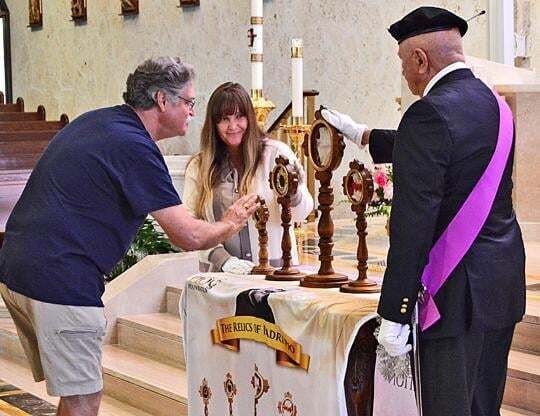
PALM BEACH GARDENS | The faithful came from far and wide Sept. 16 to venerate the relics of St. Pio of Pietrelcina (Padre Pio) and ask for his intercession at the Cathedral of St. Ignatius Loyola in Palm Beach Gardens. Hundreds of pilgrims gathered for evening Mass and a pre-release screening of a docudrama on the saint’s life, produced by the Saint Pio Foundation and EWTN.
Starting at about 10 a.m., people were permitted to pray in the presence of St. Pio’s relics, which are either parts of a saint’s body, possessions that a saint owned or something used by a saint. The relics at the cathedral included crusts from his stigmata (wounds of Christ on hands, feet and side), a handkerchief used during a Mass to wipe his tears, a lock of his hair, one of his white gloves and a piece of his cloak.
Pilgrims maintained a vigil in the pews while others continued to enter the cathedral. In the late afternoon, greater numbers made their way to the church as preparations were made for a special 6 p.m. Mass dedicated to the Italian mystic, with Bishop Gerald M. Barbarito as the presider.
“We ask the Lord to help us, to help us know the loving presence of this great modern-day saint,” the bishop said, welcoming hundreds to the liturgy.
Father Albert Dello Russo, diocesan chancellor, who coordinated the visit of the relics to Florida through the Saint Pio Foundation, was the homilist at the Mass. He took the opportunity to explore elements of St. Pio’s life that made him “one of the most remarkable figures in the history of the Catholic Church, especially in the 20th century.”
During World War II, many American soldiers learned about St. Pio, and some even had the privilege of attending his Masses and meeting the future saint, Father Dello Russo said. The service members often reported incredible stories of healing, bilocation, levitation, prophecy and other miracles.
“Padre Pio was a man of great faith,” he said, “and throughout his life he used his gifts to bless and encourage those who came to him for assistance. The celebration of Mass was the center of his spirituality, and his Masses sometimes lasted more than two hours.
With help from volunteers, a visitor to the Cathedral of St. Ignatius Loyola touches the relics of St. Pio of Pietrelcina Sept. 16, 2024.
WILLIAM CONE | FC
“Padre Pio never felt worthy of these gifts. He always remained humble. He placed himself and everything he possessed in the hands of the Lord,” Father Dello Russo added. “He deprived himself of simple things just so there would be more room in his heart for Jesus. He never expected a thank you. All he did he did for the Lord. He lived the words he gave us: pray, hope and don’t worry. Have faith. Give it all to God.”
For 50 years, St. Pio endured unimaginable pains from the stigmata, often leaning on the altar so he could continue celebrating Mass, he said. Because of his poor health, the main focus of his ministry became the sacrament of penance, spending most of his days in the confessional. It is estimated that St. Pio heard 5 million confessions during his life as a Capuchin Franciscan friar, Father Dello Russo said.
“The question we invariably ask ourselves is: What made him such an outstanding confessor? Why did people flock to go to confession to him? Part of the answer,” he said, “was probably something that might appeal to most of us. He was quick. The average confession only lasted a few minutes.
“But more importantly, he demanded that each confession be a true conversion, a real meeting of faith with Christ, whom he represented in the confessional,” Father Dello Russo said. If St. Pio didn’t feel the penitent was honest or firm in their resolve — people said he seemed to know their sins better than they did — he would tell the person to leave, even if that person was a priest or bishop.
Actor Robert Davi, who appeared in the movies "Die Hard" and "License to Kill," speaks following the cathedral Mass, while Luciano Lamonarca, CEO/founder of the Saint Pio Foundation, looks on.
WILLIAM CONE | FC
After World War II, Father Dello Russo said, St. Pio realized a longtime dream of building a hospital in San Giovanni Rotondo, the southern Italy town where he lived as a religious. The effort was supported by many of the American GIs who experienced St. Pio’s ministry.
Father Dello Russo concluded his homily, saying that aside from his stigmata and miracles, St. Pio “had a heart for the people. God inspired him to do great things because this simple, humble man only wanted to serve the Lord and serve his people. He had a very important role to play in the lives of the people of San Giovanni Rotondo. From this tiny village, Padre Pio showed the world how to love the Lord.”
Shortly after the Mass, actor Robert Davi, who appears in the docudrama, “Saint Pio of Pietrelcina: Man of Hope and Healing,” gave a short talk in support of the Saint Pio Foundation and its efforts to spread knowledge of and devotion to St. Pio. Davi, who lives in Apollo Beach, Florida, attended the Mass and screening with his wife and one of his eight children.
In the film, Davi tells of a serious unknown illness he suffered as a high school student. Davi’s family sought help from a well-known blind man in New York named Joey Lomangino, who had received the sacrament of penance from St. Pio and experienced a miraculous return of his sense of smell. The family thought perhaps St. Pio could pray for healing for the young Davi.
St. Pio sent a telegram to his family assuring them of his prayers, and a week later, Davi was healed of the illness.
“They call Padre Pio a man of hope and healing,” Davi says in the film. “When you’ve experienced that and give that to other people, it’s something you feel very close to Christ through Padre Pio.”
DOCUDRAMA
The docudrama, “Saint Pio of Pietrelcina: Man of Hope and Healing,” includes a mixture of documentary footage and scenes with actors depicting events in St. Pio’s life. Narrated by actor Joe Mantegna, the film features appearances by Davi, actor Gary Sinise, Cardinal Edwin O’Brien, grand master emeritus of the Equestrian Order of the Holy Sepulchre of Jerusalem, and others who knew the saint and had regular contact with him.
Luciano Lamonarca, CEO/founder of the Saint Pio Foundation, a trained opera singer who attended the screening and sang “Ave Maria” at the cathedral Mass, said he would be immediately traveling to oversee showings of the docudrama in California, Texas, Pennsylvania and New York.
The film can be viewed for free on the foundation’s website at https://saintpiofoundation.org/docudrama and EWTN’s on-demand platform at ondemand.ewtn.com.

